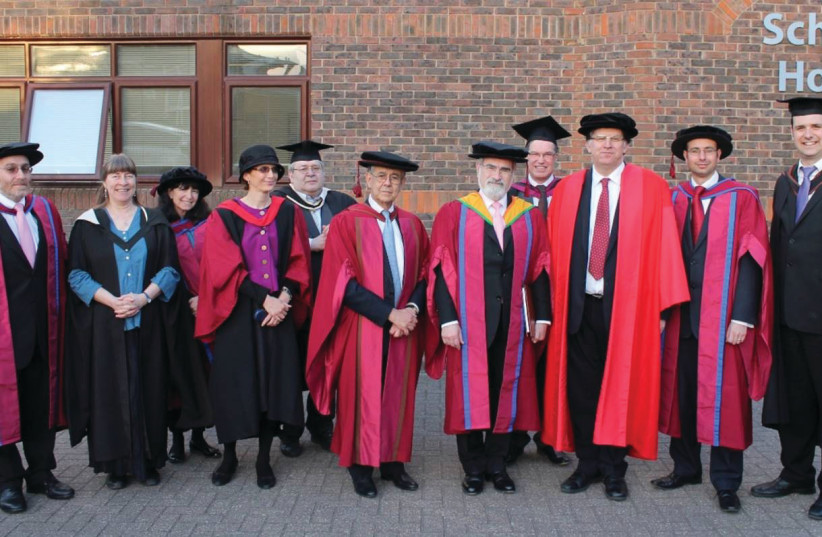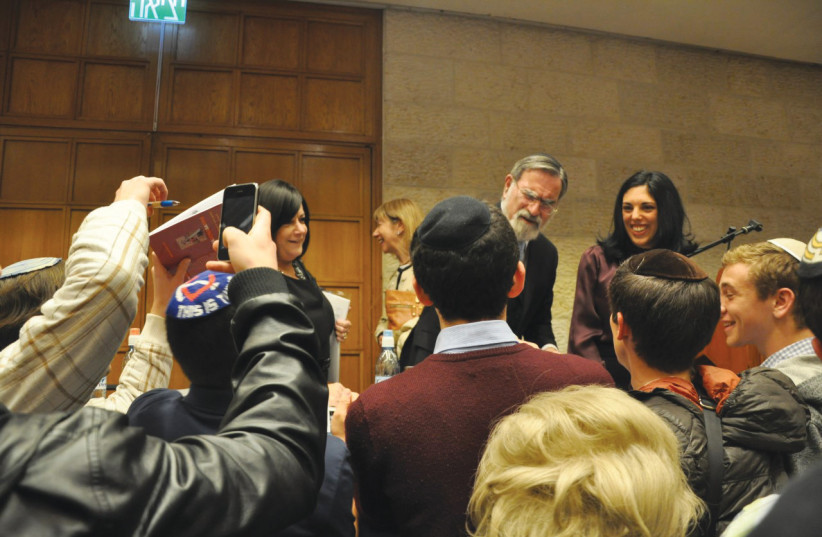“Benjy, we need to realize that the key to successful Jewish education is nurturing and maintaining positive and meaningful relationships with our students. ” Rabbi Lord Jonathan Sacks said these words to me when I interviewed him in his office more than 25 years ago when doing research for my master’s degree thesis, and how true they are. Whether we knew him personally or not, Sacks had an influence on so many of us. A year after his death, we are all mourning that special relationship we had with him.
Whether through his radio broadcasts and newspaper articles or his lectures and books, when Sacks spoke the world listened and took note. Whether it was fighting antisemitism in the House of Lords or defending Israel on social media, Sacks elegantly and articulately presented the Jewish opinion or Israeli perspective. We have lost Sacks’s clear and powerful voice that gave us such pride, clarity and confidence.
Sacks was not just the chief rabbi of Anglo Jewry and the British Commonwealth, but become the chief rabbi of Judaism on the international arena - like our forefather, Abraham, he spread the message of faith and monotheism to all of humanity. Sacks was the ambassador of Judaism to the world. In that role, he is unparalleled and irreplaceable.
As we mark the first anniversary of his death, The Jerusalem Report spoke with four leading international Jewish educators, to hear from them their personal memories of Sacks.
Rabbi Dr. Raphael Zarum is the dean of the London School of Jewish Studies (the LSJS, formerly Jews’ College) – where Rabbi Sacks was president and taught for more than 40 years. He says “Rabbi Sacks wanted to make Torah accessible and Judaism meaningful to thoroughly modern people. He was a rav for our time. He understood the challenges of living as a committed Jew and spoke the language of the people.

“Rabbi Sacks was a master at encouraging others and helping them progress,” says Zarum. “I remember one Sunday morning he took the time to call and tell me how much his mother had enjoyed a shiur I’d given on Shabbat in her community. I thought to myself, if I received this call from him, how many others is he calling to thank them for what they have done? And this was the chief rabbi! He always made us challenge ourselves, asking us: what are you doing next? What is your next project?
“In one of his final books, Morality, he writes of the influence his early experiences as a young community rabbi had on him. He said he learnt more about morality from conducting funerals than he did from his studies at Oxford and Cambridge. When the mourners described the departed it was never in terms of fame, wealth and work. Instead, they spoke about their love of family and community, giving charity and helping others. This, he said, is what really matters.
“Rabbi Sacks was a genius at speaking to the moment. He was a master orator, making Torah relevant and engaging. But he wasn’t looking for blind followers, he wanted us to engage with his ideas, think about and discuss them. He wanted us to discover our own paths.
“When I had personal leadership challenges, I would speak with Rabbi Sacks. If I was stuck or hurt, I turned to him to reflect and analyze how to respond. He always inspired me and gave me chizuk (strength). He taught me that despite all the hardships of being a leader, you must learn from the past, pick yourself up, and move on. ‘Never give up!’ he’d say. I think he believed in us, his students, more than we believed in ourselves.
“Back in 2004, Rabbi Sacks was heavily involved in the renaissance of LSJS. “Together with Marc Weinberg, myself and a group of young leaders, Rabbi Sacks gave us the confidence and unwavering support we needed to make LSJS the success it is now is, as a renowned center of teacher training and adult education. He guided us on what to teach, how to teach it, and to continually improve.
“I’ll never forget the buzz in the room before his annual pre-Rosh Hashanah lecture at the LSJS. What was he going to say this year? He brought the Torah to life, he made ideas matter. Who else could do that on a rainy Tuesday evening?

Zarum concludes, “Rabbi Sacks taught us the power of ideas and that Judaism meant living meaningfully and thoughtfully. That the Torah still has so much more to teach us about life, the universe and everything. He inspired us to make a difference, for ourselves, our community, Am Yisrael, and the world.”
Gila Fine, popular lecturer and writer, who edited 16 of Rabbi Sacks’ books and helped launch him in Israel, recalls her first meeting with him. “What struck me most was his kindness – perhaps because I was least expecting it. I expected to meet an intellectual giant. I didn’t expect to meet a true tzaddik. In fact, until that day, I didn’t quite believe people could be both. No one, I thought, could be so great a saint and so brilliant a scholar. And then I met Rabbi Sacks.
“Behind the majesty and grander, the profound philosophy and inspiring Torah, the booming voice and yellow ties, there was a man. A man who, to paraphrase a quote Rabbi Sacks loved, might have born great, might have had greatness thrust upon him, but whose greatness was ultimately something he achieved. A man who worked harder, who pushed himself further than anyone I’d ever known. A man who had struggled and, having known vulnerability himself, was acutely sensitive to vulnerability in others.
“For every one of his thousand-person lectures and mass-media appearances, there was a private conversation where, unreported and unsung, Rabbi Sacks gave of himself to others in need. He consoled the bereaved, guided the lost, supported the desolate, and comforted the lonely.
“I remember, in one of our conversations, I lamented how we Jews have deemphasized love, how we let Christianity divest us of this fundamental religious value. Rabbi Sacks, ever the optimist, said: ‘Never you mind, Gila; we’ll bring love back.’ That was Rabbi Sacks. A loving and compassionate leader. Much has been written, much will still be written, about Rabbi Sacks the towering philosopher, the influential chief rabbi, the ultimate Jewish spokesman. But for me, Rabbi Sacks will always be the man who brought love back,” concludes Fine.
Rabbi Alex Israel, author and popular educator says, “I never met Rabbi Sacks without him challenging me to do more, to be more for the Jewish world. Rabbi Sacks had a deep belief that Judaism could raise us all as individuals, as Jews, as a society and as a global community. His legacy is beautifully expressed in his writings.
“His messages are manifold, and it is impossible to reduce them to a single soundbite. But he would certainly want us to study Torah, live our Judaism more deeply, while feeling the presence of God spurring us to greater action, increased mutual understanding and kindness,” believes Israel.
Tanya White, lecturer of tanach and jewish thought reflects ,”when asked about the impact Rabbi Sacks had on me as an educator, the answer is simple: “He taught me that education is not a profession, or a career choice. Education is the entire edificial framework on which not only Judaism, but the world stands.”
White continues, “Rabbi Sacks did not just educate, he made us all into educators. He did not just lead, he made us all into leaders. He did was not just a man of unbridled faith, he transformed that faith into a moral imperative inspiring others to act. “
White says that as an educator, Sacks’ final written words stand as his eternal legacy:
“We will not complete the journey; therefore inspire others to continue what we began”. (Judaism’s Life Changing Ideas)
White concludes: “There is no doubt, that this ‘life changing idea’ is something he achieved on an incalculable scale. I for one, can no longer determine where Rabbis Sacks ideas stop and my ideas start. I have imbibed his teaching to such an extent that they are an intrinsic part of who I am. To this end, my prayer is that I, together with so many others will continue to humbly walk down the path that this great giant strode.”
“Leaders create followers; great leaders create leaders,” said Rabbi Sacks. In that way, Rabbi Sacks was one of the greatest leaders in jewish history, who through the attractive and engaging way he presented Judaism has produced hundreds, if not thousands, of rabbis and teachers throughout the Jewish world, who continue to transmit his ideas and values.
The death of Sacks has left us all with a challenge – to learn and then share our ideas and thoughts with others. In that process of obtaining and transmitting knowledge, we become an integral part of the Jewish tradition and live for eternity – like Rabbi Sacks.
